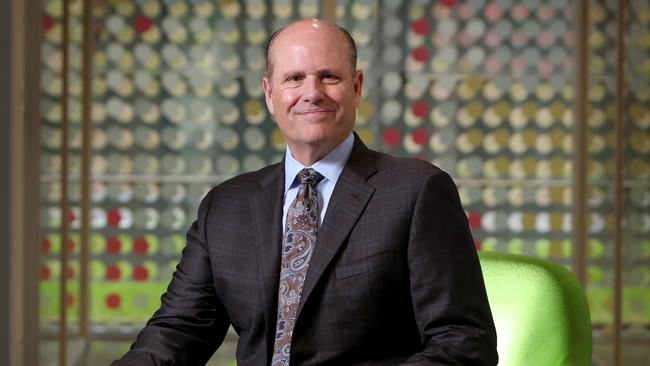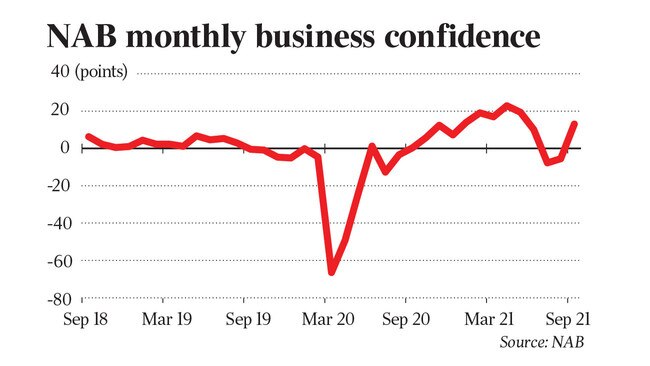Vaccinations can end political blame game: CSL
CSL chief Paul Perreault has warned that the politicisation of Covid-19 is fuelling vaccination hesitancy as the global pharma giant makes jabs mandatory.

CSL chief Paul Perreault has warned that the politicisation of Covid-19 is fuelling vaccination hesitancy as the global pharma giant makes jabs mandatory across all its Australian and US sites.
The boss of the company that manufactures AstraZeneca’s Covid vaccine in Australia says getting the vaccine is still the main weapon in combating the pandemic but political blame games potentially put a handbrake on easing back to normality.
“Vaccines are really good medicine and it’s the way to help prevent disease. This is what should be done for human health,” Mr Perreault said.
“The problem is it’s become so political. Every country has made it very political – UK, Australia, US – everybody wants to take a side and blame the other side that’s not involved or was involved or could be involved. It’s like ‘we’ve got the answer, we would have done it differently’.
“It’s just unhelpful because people really see this as a human health issue, not a political issue.”
His comments came as Telstra chief executive Andy Penn on Tuesday urged a shift to a reopening plan for the economy following border closures and lockdowns, saying the nation needed to ‘‘talk more courageously’’ about the reality of living with Covid.
“I know in this environment the temptation is to be cautious,” he said.
“To not say anything until you are absolutely certain. To not take any risks.
“But people are not naive. They know there are no guarantees, but they do expect to see from their leaders a sense of confidence, a sense of direction, something to reassure them that there is a path forward and it’s our job to deliver it.”
Business confidence bounced sharply higher in September, according to National Australia Bank, with firms in the locked-down states of NSW and Victoria buoyed by the prospect of an imminent reopening even as they struggled through another month of severe health restrictions.

NAB’s monthly survey revealed the mood among Australian businesses swung from firmly negative in August to well above the long term average and a four-month high as vaccination rates climbed and leaders in NSW and Victoria outlined their road maps out of lockdown. Spending figures across Sydney, after the city’s reopening on Monday, revealed a tenfold increase in spending across previously shuttered retail and hospitality sectors.
Based on data from NAB merchant terminals, about $12.8m was spent in the state’s restaurants, pubs and bars, up from $1m the previous Monday. Retail spending lifted from $35m to $100m.
“The rise in confidence suggests they (surveyed businesses) see the road maps that have been announced as sufficient to allow activity to really rebound in the coming months,” NAB chief economist Alan Oster said.
At its annual meeting on Tuesday, CSL declared that it would make Covid-19 vaccines compulsory across all its Australian sites and it intended to do the same in the US, where it sources blood plasma to make its suite of lifesaving medicines.
Its mandatory policy brings it in line with fruit and vegetable cannery SPC, Qantas, Telstra, BHP and Australia’s second biggest private hospital operator Healthscope.
CSL chairman Brian McNamee said: “These policies – and the net effect of a healthier population – are important in allowing the world to return to prosperity”.
“A full economic recovery is dependent on vaccine uptake. This has been widely recognised: less than a fortnight ago, the Victorian government issued a directive that all authorised workers must be vaccinated.
“In line with our responsibility to ensure the safety of people in our workplace, we have extended this mandate to all those at our Australian sites, and we intend to do the same at our US operations in keeping with requirements set by the US government.
“I encourage all to continue to reflect the spirit that we have seen come to the fore throughout the pandemic so far: a spirit of working for the collective community for the greater good of society.”
Only a handful of Australian companies have mandated Covid-19 vaccines, with many hesitant to implement such a policy because of Australia’s industrial laws and framework.
However, in the US a range of household names including Microsoft, Walmart, Google, Facebook, Netflix and rideshare giants Uber and Lyft have mandated vaccination.
ANZ chief executive Shayne Elliott has taken a more nuanced approach to Covid-19 vaccinations, stopping short of implementing a mandate across his bank because 91 per cent of staff have already received at least one jab.
Mr Elliott told all local ANZ staff in an email on Tuesday that there was “no real need” to incentivise them to get vaccinated as they were already well ahead of the national trend.
A recent staff survey, to which one-third of employees responded, had shown that 91 per cent were on their way to being fully vaccinated, and much of the remainder had an open mind.
“At this stage, we will not be requiring that vaccination against Covid-19 is a condition of employment, except where there is a government requirement that we do so,” Mr Elliott said. The Australian government has leant heavily on CSL during the pandemic, contracting it to produce more than 50 million doses of the AstraZeneca vaccine, which was originally intended to inoculate most of the population.
But advice around AstraZeneca’s jab changed earlier this year after it was linked to rare blood clots, relegating it for use on those over 60, and fuelling vaccine hesitancy.
“Notwithstanding the perhaps disproportionate criticism that this vaccine’s reputation has experienced, we couldn’t be prouder that the AstraZeneca vaccine has given protection to many millions of Australians, and even more will be sent to support our neighbours in the region,” Dr McNamee said.




To join the conversation, please log in. Don't have an account? Register
Join the conversation, you are commenting as Logout